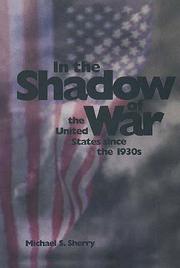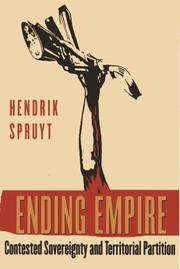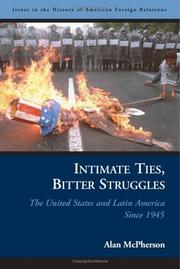| Listing 1 - 10 of 893 | << page >> |
Sort by
|
Periodical
Year: 1961 Publisher: [Helsinki, Ulkopolittinen Instituutti]
Abstract | Keywords | Export | Availability | Bookmark
 Loading...
Loading...Choose an application
- Reference Manager
- EndNote
- RefWorks (Direct export to RefWorks)
Periodical
Abstract | Keywords | Export | Availability | Bookmark
 Loading...
Loading...Choose an application
- Reference Manager
- EndNote
- RefWorks (Direct export to RefWorks)
Periodical
Year: 1991 Publisher: La Plata, Argentina : Instituto de Relaciones Internacionales
Abstract | Keywords | Export | Availability | Bookmark
 Loading...
Loading...Choose an application
- Reference Manager
- EndNote
- RefWorks (Direct export to RefWorks)
International relations --- World politics --- Since 1989 --- Since 1989.
Book
ISBN: 1527541398 Year: 2019 Publisher: Newcastle upon Tyne, England : Cambridge Scholars Publishing,
Abstract | Keywords | Export | Availability | Bookmark
 Loading...
Loading...Choose an application
- Reference Manager
- EndNote
- RefWorks (Direct export to RefWorks)
This book scrutinizes historical controversies regarding the past and the future of Japan in the age of Emperor Akihito. In Section I, each chapter discusses a different aspect of the historical controversy. The text then moves on to present a collection of the public discourse of Emperor Akihito, which offers a valuable source for analysis. This investigation of the constitutionally prescribed role of the Emperor as a national symbol will serve to help the reader understand contemporary Japanese society.
Emperors --- History. --- Akihito, --- Since 1989 --- Japan --- Japan. --- History --- Since 1989.

ISBN: 0585356246 9780585356242 9780300072631 0300072635 0300061110 0300072635 9780300061116 0300061110 Year: 1997 Publisher: [Place of publication not identified] Yale University Press
Abstract | Keywords | Export | Availability | Bookmark
 Loading...
Loading...Choose an application
- Reference Manager
- EndNote
- RefWorks (Direct export to RefWorks)
United States --- Politics and government --- 1933-1945 --- 1945-1989 --- History [Military ] --- 20th century --- 1989 --- -United States - Politics and government - 1989 --- -United States --- -United States - Politics and government - 1989-
Book
ISBN: 1283953358 1780422091 9781780422091 Year: 2004 Publisher: New York : Parkstone Press International,
Abstract | Keywords | Export | Availability | Bookmark
 Loading...
Loading...Choose an application
- Reference Manager
- EndNote
- RefWorks (Direct export to RefWorks)
As one of the foremost painters of the 20 th century, Dalí, like Picasso and Warhol, can boast of having overturned the art of the previous century and directed painting towards its modern incarnation. As irrational as he was Surrealist, this genius diverted objects from their original meanings, plunging them into the acid of his constantly churning imagination. A megalomaniac and an artist who, above all, understood the force of marketing and publicity, Dali disorients the viewer in order to draw him or her into his world. Images and colours crash together to express and mock certain ideas, c
Periodical
ISSN: 27151565 Year: 2001 Publisher: Surabaya : Laboratorium Masalah Hubungan Internasional, Program Studi Ilmu Hubungan Internasional, Fakultas Ilmu Sosial dan Ilmu Politik, Universitas Airlangga,
Abstract | Keywords | Export | Availability | Bookmark
 Loading...
Loading...Choose an application
- Reference Manager
- EndNote
- RefWorks (Direct export to RefWorks)
On International relations studies.
Book
ISBN: 9789033499067 Year: 2014 Publisher: Leuven Den Haag Acco
Abstract | Keywords | Export | Availability | Bookmark
 Loading...
Loading...Choose an application
- Reference Manager
- EndNote
- RefWorks (Direct export to RefWorks)
Eind de jaren '80 van de vorige eeuw viert president Gorbatsjov in de Sovjet-Unie de teugels. Het strenge communisme ruimt er plaats voor meer openheid en vrijheid. De nieuwe wind waait ook over naar de rest van het Oostblok. De Berlijnse Muur en het IJzeren Gordijnen vallen. 1989 is het jaar van de revoluties. Bijna alle regimes uit communistisch Oost-Europa zetten hun eerste stappen richting democratie. Maar Roemenië geeft geen krimp. Ceausescu blijft zijn eigen, dictatoriale koers varen. Het zijn Belgen - journalisten en mensen uit de culturele sector - die er mee voor zorgen dat de publieke opinie in het Westen de ogen opent voor de terreur van het Ceausescu-regime. Door hen wordt de stem van dissidenten als Doina Cornea en Ana Blandiana gehoord. Op 20 december 1989 breekt in de stad Timisoara dan toch een volksrevolutie uit, die zich algauw uitbreidt tot heel Roemenië. Aan de laatst gevallen dominosteen van de dictaturen in het Oostblok kleeft helaas veel bloed. Ook Vlaams journalist Danny Huwé kwam er om het leven.
History of Eastern Europe --- anno 1980-1989 --- Romania --- Roemenië --- geschiedenis --- History --- Revolution, 1989 --- Roemenië.

ISBN: 0801489725 0801443148 1501717871 Year: 2018 Volume: *23 Publisher: Ithaca, NY : Cornell University Press,
Abstract | Keywords | Export | Availability | Bookmark
 Loading...
Loading...Choose an application
- Reference Manager
- EndNote
- RefWorks (Direct export to RefWorks)
At the dawn of the twentieth century, imperial powers controlled most of the globe. Within a few decades after World War II, many of the great empires had dissolved, and more recently, multinational polities have similarly disbanded. This process of reallocating patterns of authority, from internal hierarchy to inter-state relations, proved far more contentious in some cases than in others. While some governments exited the colonial era without becoming embroiled in lengthy conflicts, others embarked on courses that drained their economies, compelled huge sacrifices, and caused domestic upheaval and revolution. What explains these variations in territorial policy? More specifically, why do some governments have greater latitude to alter existing territorial arrangements whereas others are constrained in their room for maneuver?In Ending Empire, Hendrik Spruyt argues that the answer lies in the domestic institutional structures of the central governments. Fragmented polities provide more opportunities for hard-liners to veto concessions to nationalist and secessionist demands, thus making violent conflict more likely. Spruyt examines these dynamics in the democratic colonial empires of Britain, France, and the Netherlands. He then turns to the authoritarian Portuguese empire and the break-up of the Soviet Union. Finally, the author submits that this theory, which speaks to the political dynamics of partition, can be applied to other contested territories, including those at the heart of the Arab-Israeli conflict.
Decolonization --- Dekolonisatie --- Décolonisation --- Postcolonialism --- Postcolonialisme --- Postkolonialisme --- Decolonization. --- Postcolonialism. --- World politics --- Dekolonisation --- Descolonização --- 1945-1989 --- 1989 --- -Decolonization

ISBN: 1597973939 9781597973939 1574888757 9781574888751 1574888765 9781574888768 Year: 2006 Publisher: Washington, D.C. : Baltimore, Md. : Potomac Books, Project MUSE,
Abstract | Keywords | Export | Availability | Bookmark
 Loading...
Loading...Choose an application
- Reference Manager
- EndNote
- RefWorks (Direct export to RefWorks)
Provides a concise and highly readable introduction to U.S.-Latin American relations
United States --- Latin America --- Foreign relations --- 1948-1980 --- 1980 --- -United States --- 1945-1989 --- 1989
| Listing 1 - 10 of 893 | << page >> |
Sort by
|

 Search
Search Feedback
Feedback About UniCat
About UniCat  Help
Help News
News